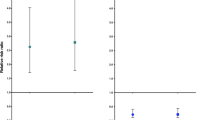Abstract
Objective
To evaluate the effect of implementing World Health Organization (WHO) low birth weight (LBW) feeding guidelines in First Referral Level health facilities in India.
Methods
This was a before-and-after study conducted at two First Referral Level health facilities in India. In the pre and post implementation periods of 4 mo each, the authors compared knowledge and skills of health care providers (HCPs) with regard to feeding of LBW infants using multiple choice and short answer questions and objective structured clinical examinations. The authors also enrolled in the two periods, separate cohorts of LBW infants along with their mothers at birth, and followed them till 2 wk of age or death/discharge. Quality of care received by the infants was assessed at 24–48 h and at discharge/2 wk using pre-determined parameters based on which quality scores were assigned by experienced neonatologists. Knowledge and skills of the mothers were also assessed at these time points through semi structured questionnaires and observation checklists. Guidelines were implemented using specially prepared training material through seminars, workshops, refresher courses and on-job support.
Results
Overall knowledge (62 ± 16 vs. 75 ± 15, n = 55; p < 0.01) and skill scores (298 ± 37 vs. 348 ± 52, p < 0.05) of HCPs improved. Correct knowledge increased among the mothers at the time of discharge (7.1 % vs. 63.4 %; p < 0.01). However, there was no improvement in maternal feeding skills at either 24–48 h or at discharge and key feeding practices remained unchanged. Though there was increased uptake of kangaroo mother care (0 vs. 21.9 %; p < 0.01) and alternate methods of feeding (15.9 % vs. 31.7 %; p = 0.03) by discharge/14 d, there was no significant improvement in overall quality of care of LBW infants (4.8 % vs. 6.7 %; p = 0.55).
Conclusions
For the Guidelines to be fully effective, additional efforts on part of HCPs/additional staff and efforts to promote generic early feeding practices in addition to LBW focused guidelines would be required.


Similar content being viewed by others
References
United Nations Children’s Fund and World Health Organization. Low Birth weight: Country, regional and global estimates. New York: UNICEF; 2004.
Lawn JE, Cousens S, Zupan J; Lancet Neonatal Survival Steering Team. 4 million neonatal deaths: when? Where? Why? Lancet. 2005;365:891–900.
Mullany LC, Katz J, Li YM, et al. Breast-feeding patterns, time to initiation, and mortality risk among newborns in southern Nepal. J Nutr. 2008;138:599–603.
Edmond KM, Kirkwood BR, Amenga-Etego S, Owusu-Agyei S, Hurt LS. Effect of early infant feeding practices on infection-specific neonatal mortality: an investigation of the causal links with observational data from rural Ghana. Am J Clin Nutr. 2007;86:1126–31.
Edmond K, Bahl R. Optimal feeding of low-birth-weight infants : technical review: World Health Organization; 2006.
Acknowledgments
The authors acknowledge the contribution of Dr. Rajiv Bahl, Medical Officer, Newborn Health Research and Development, World Health Organization, Geneva, for his guidance and support. ICMR Center for Advanced Research supported the salary of Dr Shuchita Gupta.
Contributions
Agarwal R, Paul VK, Deorari AK, Chawla D, Sankar MJ, Thukral A, Lal S, Sreenivas V, Saksena M: Protocol and study tools development; Agarwal R, Mishra S, Thukral A, Sankar MJ, Chawla D, Jain A, Bisht SS, Maria A, Dalal SS, Narayan S, Jain A, Sivanandan S, George G, Joshi M, Paul JS, Simak K, Sarasan S, Honeymol KC: Study implementation; Agarwal R, Paul VK, Chawla D, Sankar MJ: Quality assurance; Lal S, Suresh SS, Agarwal R, Sankar MJ: Data management; Gupta S, Yadav CP, Sankar MJ, Agarwal R, Suresh SS: Data analysis; Gupta S, Agarwal R, Sankar MJ, Paul VK: Manuscript writing. Agarwal R will act as guarantor for this paper.
Conflict of Interest
None.
Source of Funding
World Health Organization, Geneva.
Author information
Authors and Affiliations
Consortia
Electronic supplementary material
Rights and permissions
About this article
Cite this article
Investigators of WHO LBW Feeding Study Group, Delhi, India. World Health Organization Guidelines for Feeding Low Birth Weight Infants: Effects of Implementation in First Referral Level Health Facilities in India. Indian J Pediatr 83, 522–528 (2016). https://doi.org/10.1007/s12098-015-1874-4
Received:
Accepted:
Published:
Issue Date:
DOI: https://doi.org/10.1007/s12098-015-1874-4




